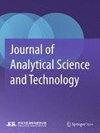Quantification of bone surface textures: exploring a new method of ontogenetic ageing
IF 2.8
4区 化学
Q3 CHEMISTRY, ANALYTICAL
引用次数: 0
Abstract
Identification of ontogenetic age classes plays an important role in the fields of zoology, palaeontology and archaeology, where accurate age classifications of (sub)fossil remains are a crucial component for the reconstruction of past life. Textural ageing—the identification of age-related bone surface textures—provides a size-independent method for age assessment of vertebrate material. However, most of the work so far is limited to qualitative results. While qualitative approaches provide helpful insights on textural ageing patterns, they are heavily subject to observer bias and fall short of quantitative data relevant for detailed statistical analyses and cross-comparisons. Here, we present a pilot study on the application of 3D surface digital microscopy to quantify bone surface textures on the long bones of the grey heron (Ardea cinerea) and the Canada goose (Branta canadensis) using internationally verified roughness parameters. Using a standardised measuring protocol, computed roughness values show a strong correlation with qualitative descriptions of textural patterns. Overall, higher roughness values correspond to increased numbers of grooves and pits and vice versa. Most of the roughness parameters allowed distinguishing between different ontogenetic classes and closely followed the typical sigmoidal animal growth curve. Our results show that bone texture quantification is a feasible approach to identifying ontogenetic age classes.骨表面纹理定量:探索本体老化的新方法
个体发生年龄分类的确定在动物学、古生物学和考古学等领域具有重要意义,对化石遗骸进行准确的年龄分类是重建过去生命的重要组成部分。纹理老化-识别与年龄相关的骨表面纹理-为脊椎动物材料的年龄评估提供了一种与尺寸无关的方法。然而,到目前为止,大多数工作都局限于定性结果。虽然定性方法对纹理老化模式提供了有用的见解,但它们严重受到观察者偏见的影响,并且缺乏与详细统计分析和交叉比较相关的定量数据。在这里,我们提出了一项应用3D表面数字显微镜的试点研究,使用国际验证的粗糙度参数来量化灰色苍鹭(Ardea cinerea)和加拿大鹅(Branta canadensis)长骨的骨表面纹理。使用标准化的测量方案,计算出的粗糙度值与纹理模式的定性描述有很强的相关性。总的来说,较高的粗糙度值对应于沟槽和凹坑数量的增加,反之亦然。大多数粗糙度参数可以区分不同的个体发生类别,并密切遵循典型的s型动物生长曲线。我们的研究结果表明,骨质定量是一种确定个体发生年龄类别的可行方法。
本文章由计算机程序翻译,如有差异,请以英文原文为准。
求助全文
约1分钟内获得全文
求助全文
来源期刊

Journal of Analytical Science and Technology
Environmental Science-General Environmental Science
CiteScore
4.00
自引率
4.20%
发文量
39
审稿时长
13 weeks
期刊介绍:
The Journal of Analytical Science and Technology (JAST) is a fully open access peer-reviewed scientific journal published under the brand SpringerOpen. JAST was launched by Korea Basic Science Institute in 2010. JAST publishes original research and review articles on all aspects of analytical principles, techniques, methods, procedures, and equipment. JAST’s vision is to be an internationally influential and widely read analytical science journal. Our mission is to inform and stimulate researchers to make significant professional achievements in science. We aim to provide scientists, researchers, and students worldwide with unlimited access to the latest advances of the analytical sciences.
 求助内容:
求助内容: 应助结果提醒方式:
应助结果提醒方式:


